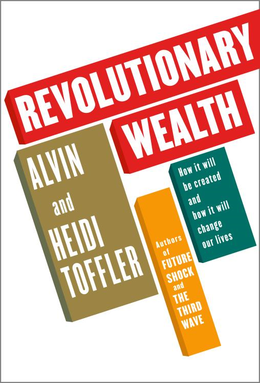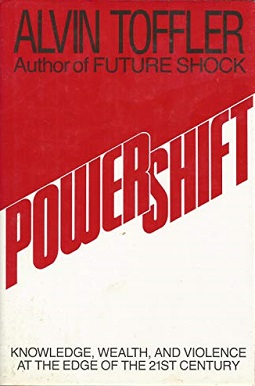
Alvin Eugene Toffler was an American writer, futurist, and businessman known for his works discussing modern technologies, including the digital revolution and the communication revolution, with emphasis on their effects on cultures worldwide. He is regarded as one of the world's outstanding futurists.
In political science, a revolution is a rapid, fundamental transformation of a society's class, state, ethnic or religious structures. According to sociologist Jack Goldstone, all revolutions contain "a common set of elements at their core: (a) efforts to change the political regime that draw on a competing vision of a just order, (b) a notable degree of informal or formal mass mobilization, and (c) efforts to force change through noninstitutionalized actions such as mass demonstrations, protests, strikes, or violence."

The Information Age is a historical period that began in the mid-20th century. It is characterized by a rapid shift from traditional industries, as established during the Industrial Revolution, to an economy centered on information technology. The onset of the Information Age has been linked to the development of the transistor in 1947 and the optical amplifier in 1957. These technological advances have had a significant impact on the way information is processed and transmitted.
An information society is a society or subculture where the usage, creation, distribution, manipulation and integration of information is a significant activity. Its main drivers are information and communication technologies, which have resulted in rapid growth of a variety of forms of information. Proponents of this theory posit that these technologies are impacting most important forms of social organization, including education, economy, health, government, warfare, and levels of democracy. The people who are able to partake in this form of society are sometimes called either computer users or even digital citizens, defined by K. Mossberger as “Those who use the Internet regularly and effectively”. This is one of many dozen internet terms that have been identified to suggest that humans are entering a new and different phase of society.

Future Shock is a 1970 book by American futurist Alvin Toffler, written together with his wife Adelaide Farrell, in which the authors define the term "future shock" as a certain psychological state of individuals and entire societies, and a personal perception of "too much change in too short a period of time". The book, which became an international bestseller, has sold over 6 million copies and has been widely translated.
In demography, demographic transition is a phenomenon and theory which refers to the historical shift from high birth rates and high death rates to low birth rates and low death rates, as societies attain more technology, education and economic development. The demographic transition has occurred in most of the world over the past two centuries, bringing the unprecedented population growth of the post-Malthusian period, then reducing birth rates and population growth significantly in all regions of the world. The demographic transition strengthens economic growth process by three changes: (i) reduced dilution of capital and land stock, (ii) increased investment in human capital, and (iii) increased size of the labor force relative to the total population and changed age population distribution. Although this shift has occurred in many industrialized countries, the theory and model are frequently imprecise when applied to individual countries due to specific social, political and economic factors affecting particular populations.

In sociology, the post-industrial society is the stage of society's development when the service sector generates more wealth than the manufacturing sector of the economy.

The New World Order (NWO) is a term used in several conspiracy theories which hypothesize a secretly emerging totalitarian world government. The common theme in conspiracy theories about a New World Order is that a secretive power elite with a globalist agenda is conspiring to eventually rule the world through an authoritarian one-world government—which will replace sovereign nation-states—and an all-encompassing propaganda whose ideology hails the establishment of the New World Order as the culmination of history's progress. Many influential historical and contemporary figures have therefore been alleged to be part of a cabal that operates through many front organizations to orchestrate significant political and financial events, ranging from causing systemic crises to pushing through controversial policies, at both national and international levels, as steps in an ongoing plot to achieve world domination.
A prosumer is an individual who both consumes and produces. The term is a portmanteau of the words producer and consumer. Research has identified six types of prosumers: DIY prosumers, self-service prosumers, customizing prosumers, collaborative prosumers, monetised prosumers, and economic prosumers.
An agrarian society, or agricultural society, is any community whose economy is based on producing and maintaining crops and farmland. Another way to define an agrarian society is by seeing how much of a nation's total production is in agriculture. In agrarian society, cultivating the land is the primary source of wealth. Such a society may acknowledge other means of livelihood and work habits but stresses the importance of agriculture and farming. Agrarian societies have existed in various parts of the world as far back as 10,000 years ago and continue to exist today. They have been the most common form of socio-economic organization for most of recorded human history
A complex society is characterized by the following modern features:
The difference between material culture and non-material culture is known as culturallag. The term cultural lag refers to the notion that culture takes time to catch up with technological innovations, and the resulting social problems that are caused by this lag. In other words, cultural lag occurs whenever there is an unequal rate of change between different parts of culture causing a gap between material and non-material culture. Subsequently, cultural lag does not only apply to this idea only, but also relates to theory and explanation. It helps by identifying and explaining social problems to predict future problems in society. The term was first coined in William F. Ogburn's 1922 work Social Change with Respect to Culture and Original Nature.
The 5th Wave is a weekly gag cartoon by Rich Tennant, published on Sundays. Started in 1981, the comic usually deals with computers and technology. Tennant's cartoons regularly appear in the For Dummies book series, and have appeared in PC Magazine and Computerworld, a magazine for which he worked from 1987 to 1999. Like most gag cartoons, Tennant's comics have no continuity, no recurring characters, and no storylines that continue into the next week.
The modern era or the modern period is considered the current historical period of human history. It was originally applied to the history of Europe and Western history for events that came after the Middle Ages, often from around the year 1500. From the 1990s, it is more common among historians to refer to the period after the Middle Ages and up to the 19th century as the early modern period. The modern period is today more often used for events from the 19th century until today. The time from the end of World War II (1945) can also be described as being part of contemporary history. The common definition of the modern period today is often associated with events like the French Revolution, the Industrial Revolution, and the transition to nationalism towards the liberal international order.

Revolutionary Wealth is a book written by futurists Alvin Toffler and his wife Heidi Toffler, first published in 2006 by Knopf. It is a continuation of The Third Wave (1980), which itself is a sequel to Future Shock (1970).
Infosphere is a metaphysical realm of information, data, knowledge, and communication, populated by informational entities called inforgs. Infosphere is portmanteau of information and -sphere.

The Machine Age is an era that includes the early-to-mid 20th century, sometimes also including the late 19th century. An approximate dating would be about 1880 to 1945. Considered to be at its peak in the time between the first and second world wars, the Machine Age overlaps with the late part of the Second Industrial Revolution and continues beyond it until 1945 at the end of World War II. The 1940s saw the beginning of the Atomic Age, where modern physics saw new applications such as the atomic bomb, the first computers, and the transistor. The Digital Revolution ended the intellectual model of the machine age founded in the mechanical and heralding a new more complex model of high technology. The digital era has been called the Second Machine Age, with its increased focus on machines that do mental tasks.
Ephemeralization, a term coined by R. Buckminster Fuller in 1938, is the ability of technological advancement to do "more and more with less and less until eventually you can do everything with nothing," that is, an accelerating increase in the efficiency of achieving the same or more output while requiring less input. The application of materials and technology in modern cell phones, compared to older computers and phones, exemplify the concepts of Ephemeralization whereby technological advancement can drive efficiency in the form of fewer materials being used to provide greater utility. Fuller's vision was that ephemeralization, through technological progress, could result in ever-increasing standards of living for an ever-growing population. The concept has been embraced by those who argue against Malthusian philosophy.

Powershift: Knowledge, Wealth and Violence at the Edge of the 21st Century is the third book in a trilogy written by the futurist Alvin Toffler, following Future Shock (1970) and The Third Wave (1980). The hardcover first edition was published October 1, 1990.

A technological revolution is a period in which one or more technologies is replaced by another novel technology in a short amount of time. It is a time of accelerated technological progress characterized by innovations whose rapid application and diffusion typically cause an abrupt change in society.









